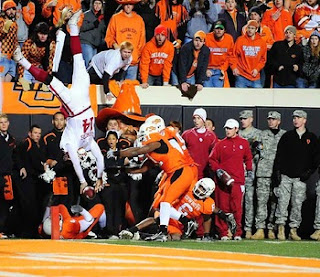What follow is my August 16, 2016 column in The Orlando Sentinel. Enjoy!
Like millions of my fellow Americans, I love August. August means that seven months of sports purgatory (see golf, NASCAR and the never-ending baseball season) ends with the blowing of a whistle and the kicking of a football. Once this opening kickoff takes place, life in America returns to normal, and we can all sit back, relax and watch exploited young men crash into each other while institutions of higher learning rake in billions off their injured backs, heads and knees.
In other words, as a fan of college football in general (and the University of Oklahoma in particular), I annually participate in, and tacitly support a cartel that would put OPEC to shame. That organization is the National Collegiate Athletic Association.
According to the Department of Education, in 2013 alone, college football generated $3.4 billion in revenue. Out of that figure, top coaches like Nick Saban of Alabama and Urban Meyer of Ohio State earn millions of dollars per year in salaries and endorsements. Those same coaches, along with athletic directors, band directors, team doctors, field-maintenance supervisors and others, all were paid by universities to work at their craft and were free to leave for another school that might offer $1 per year more.
Not the players. College football players not only receive no salary, but are restricted by NCAA guidelines in where they can move if they want to change schools but continue to play football.
As a former college athlete and professional sports agent, I have seen firsthand what a farce it is when people say, "But they are getting a free education!"
First of all, nothing is free. These players work dozens of hours per week at their sport under much tougher conditions than most of the rest of us. Second, spending this time on football creates a huge opportunity cost in the form of time lost studying or the ability to pick a challenging major that would reward them in the labor market if football does not pan out. Moreover, this "free" education comes at the cost of injury risk that can shave years off a young man's productive life.
Let's face it. Football players like the former Gators quarterback Tim Tebow are essentially employees of their university. They work at football and create millions in ticket sales, jersey sales, video-game productions and television rights.
It is time to end the indentured servitude these young men face because of the NCAA monopoly.
Every high-school player in America, if approached by a college recruiter, should be able to say, "Well, I might be willing to attend your university, but this school over here is offering me $146,000 per year to play. What is your offer?"
Critics will argue that a market-based approach would create chaos. I would ask those critics how chaotic it would be if they had 10 offers from 10 different companies at 10 different pay grades. As long as someone can do math and has a map, there would be no chaos, just an orderly meeting of the forces of supply and demand.
Colleges should be forced to treat football players like they treat other potential employees. They should have to pay the market-going value and enter into contracts. Players should have the option of attending or not attending classes. Players should have the option of signing contracts of any length — one year to 10, if they choose, and switch to other schools once their contract expires — just like their coaches do.
Under this model, Tebow might still be the quarterback at Florida. After all, he was great there, but not so great at the NFL level. I am sure Gator fans would love to have him back.
In the meantime, as the new season begins, all of us college football fans should stop for a moment to reflect on what our lives would be like if we faced the same labor-market conditions as college football players.
If we are honest, we know that they have none of the liberties we enjoy. As a result, the only conclusion we can honestly reach is that the NCAA has successfully exploited young Americans by denying them the opportunities the rest of us have.
It is also worth noting that the vast majority of college football players at the top schools happen to be African-American. Many are from impoverished homes. The NCAA would do them and their cohorts a tremendous service by allowing market-based compensation to improve their lives.
